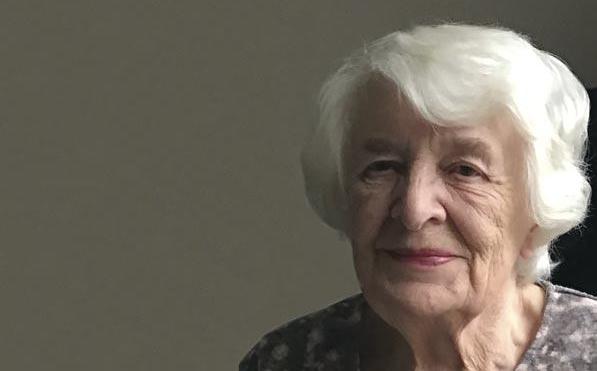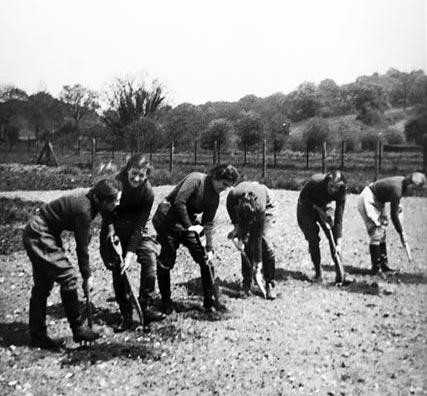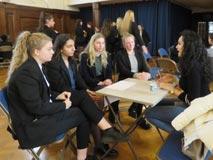
4 minute read
Brenda Barnes (Class of 1949
from Masonica 2021
Brenda Barnes
née Isitt
Advertisement
Class of 1949
Brenda Barnes left RMS in 1949. She was a pupil during the war and has vivid memories of her days at RMS. In 2020 the language of conflict has often been used to talk about the pandemic. We asked Brenda about her thoughts on the parallels between WW2 and Lockdown. Here are a few of her reflections:
The Enemy During World War Two we knew the enemy to be Adolf Hitler and his Nazi Party and were able to protect ourselves by always carrying gas masks and identity cards and taking shelter when the Warning Siren sounded. Striking posters with catchy slogans such as ‘Careless Talk Costs Lives’ (illustrated by a hat to keep information under) or ‘Dig for Victory’ (a boot driving a spade into the ground) encouraged us all to smile and play our part.
Today the enemy is an unknown virus, lurking everywhere. The different rules for each country within the UK cause confusion. The Media In wartime the country was run by a coalition of experienced Conservative, Labour and Liberal politicians with the help of Service Chiefs. Decisions were made before being published in newspapers or announced on the radio, everything passed by censor.
Today we all have too much information, largely due to the media, leaking facts, prying with long range cameras and constantly giving us their opinions.
Isolation In the early days of wartime, London councils were given the power to requisition empty properties or make use of surplus rooms in occupied houses. Consequently, a family of five Belgian refugees were billeted in our two downstairs rooms, we being confined to the large cosy kitchen. Both being three - generation families, we got on well and enjoyed experiencing each other’s cultures.
Today there are over eight million single households in the country, completely isolated during periods of lockdown and causing loneliness.
Summer 2020 Happy memories for me will be time spent in the garden, under amazing clear blue skies, due to lack of pollution, the wonderful sound of birdsong replacing the usual motorway buzz and successfully growing salad crops. Welcome family visits, me inside, family outside and lately being able to meet up with friends in the local park, catching up on their news over a cup of coffee.
Through the winter, with another lockdown I returned to the old wartime adage ‘Keep Calm and Carry On’.
Brenda is one of a group of Old Girls who penned their memories of their time at RMS during the war. We have put this amazing collection of memories together in Memories of My Schooldays, RMS in the 1940s. Here is an excerpt:
‘In 1940, my mother and I travelled from Dulwich by tram, bus ‘…Most nights there were air raids, so we had to leave our beds, and train and then took a taxi up to new school buildings just put on warm outdoor clothes and walk quickly to the trenches, six years old, with very impressive iron entrance gates, each house having its own entrance. After hot cocoa painted blue and gold. The Lodge Keeper came out and an oatmeal cake we settled down on the and after checking our papers directed us up the long tree lined drive. We entered a vast building to be greeted by Miss Mildred Harrop, Weybridge Head, as the Junior School was now evacuated to “ we had to leave our beds, put on warm outdoor narrow twelve inch benches and wrapped in a blanket tried to sleep. Later on, when the raids were not so severe, our beds were moved from the dormitories to the corridors and we only went to the Rickmansworth for the duration of World War II. We moved through to the Sanatorium for a full medical check, before clothes and walk quickly to the Trenches when the action was overhead. A bomb did drop in the Garth, but luckily, everyone kept safe. meeting the other new girls. The Bruce Twins, Elizabeth and Felicity from Hampstead, clutching bright yellow gas mask cases, and Sheila Nesbitt from Chiswick. As seven year olds, we were the trenches” ‘…Heating was minimal, no doubt due to fuel shortages, so we were issued with wool combinations to wear next to our skin and taught to four youngest girls in the school. The air raid siren sounded, fling our arms around our bodies like windmills if we felt so Sister told us to say goodbye to our mothers and hustled us shivery. Food rationing meant a limited menu with no choice, down the Trenches. Being petrified at the sight of so many girls breakfast was either a rasher of streaky bacon, a fish fillet or an in an underground tunnel, I screamed loudly hoping Mummy egg followed by as much bread as you liked, but only one butter would hear and rescue me! or margarine pat allowed. As a special treat each girl had a chipolata sausage on Sundays.’
To read more excerpts from the book turn to page 32.











